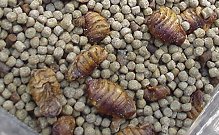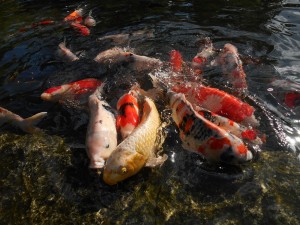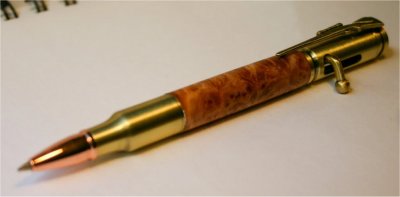In the wild, no one goes and feeds the fish. They get all they need from natural sources. In a closed private pond like you’d have in your backyard, the fish are more densely stocked, and nature’s resources are almost instantly overrun as far as nutrition is concerned, so in most cases you have to feed your fish.

The most common mistake in feeding fish is simply feeding too much. Over-feeding causes pollution, increased fish wastes, depletion of dissolved oxygen levels, and overgrowth of bacteria. All of these conditions will increase the vulnerability of your fish to disease.
Not feeding enough food causes slowed growth, and weight loss in the fish. Eventually, underfed fish will succumb to disease.
I want the process of feeding your fish to be as simple as possible so I will give you all the basics and try to ensure that you are successful.
Feeding Koi and Pond Fish What To Look For
First, find a small, oily pellet and avoid flake foods when you’re feeding pond fish. The reason I am not keen on flake foods is because the food needs to remain floating for an extended period, if only to allow you to scoop away any uneaten food after a meal. I feed the smallest possible pellet to my fish, even though I have quite a few fish which are over two feet long! What you will see is that large fish are very adept at consuming huge mouthfuls of the small pellet. The converse is NOT true. Your small fish will NOT cope well with large pellets. And they will spend disturbing amounts of time trying to eat one large pellet while ignoring the smaller more appropriate sizes.
Feeding Koi and Pond Fish How Much To Feed?
Second, feed your fish at least once per day. This will avoid the possibility of under feeding. Of course, you will encounter people who feed their fish seven or more times per day. Is this bad? No. But feeding seven or more times per day will usually result in overfeeding problems unless you’re very careful about the amounts you feed so frequently.
When you feed your fish, you should feed the fish in very small amounts for a limited amount of time. I usually distribute a small amount of food on the surface and wait until the fish are substantially finished with that and then I feed some more. Usually, my feeding sessions only last five to seven minutes. Still, quite often, I will sit down by the pond and feed tiny handfuls as long as they will eat it all up. I ALWAYS stop feeding if they get “full” and let food get to the skimmer*.
I usually only feed my fish once or twice per day, and I always skip one day per week. I am not sure if my reasoning is sound on this, but I have felt that it allows the fish to “empty out” and gives time for the environment to reach a balance or “equilibrium”.
I feed my collection of pet fish a mixture of two or three different kinds of pelleted food and also some freeze dried Krill. (See glossary)
What I look for in a “good” food formulation is a fish-based protein in the top three ingredients. I prefer to see the actual name of the fish used, but sometimes you’re not that lucky.
Most foods will use some corn and some wheat as the second or third ingredient. These plant-protein ingredients are good because they supply carbohydrate as well as some proteins.

In studies on fish, scientists were able to show that fish protein was the very best for fish. The reason I mix two or more different feeds together is to avoid vitamin and amino acid deficiencies.
I should give you an example. Let’s say one food uses poultry by product meal for it’s protein source. By it’s very nature, this protein is high in certain Amino Acids and deficient in others. If I fed only this one food, my fish would lack those Amino Acids and they would become fatty. Another food might contain nothing but fish meal. This would be very high in certain minerals and certain Amino Acids but would be lacking in other areas.
By mixing two well-formulated foods together, I can achieve quite a bit of confidence that there are no “hidden” deficiencies.





